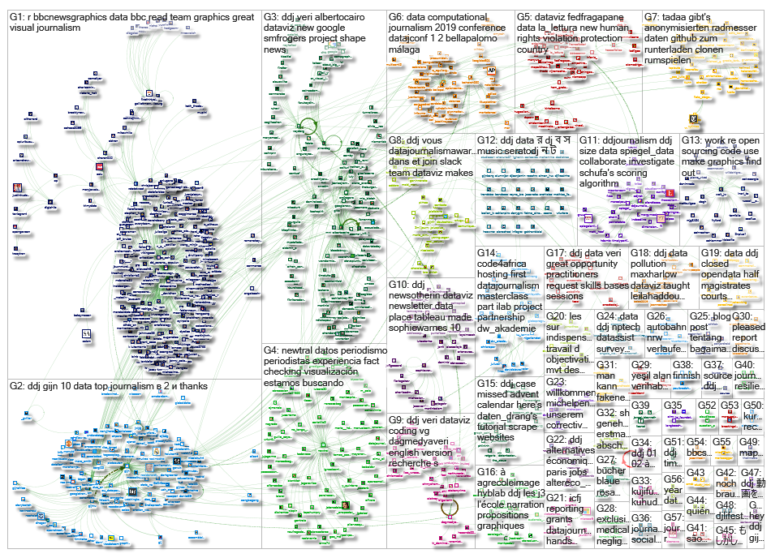What’s the global data journalism community tweeting about this week? Our NodeXL #ddj mapping from January 28 to February 3 finds @sciam highlighting a curious case of mapping cholera, @nbarrowman arguing that raw data is not as perfectly objective as imagined, @BBC tracking Trump’s performance, and @VismeApp compiling a list of the best data visualizations on climate change.
The Curious Case of Cholera Mapping
John Snow — nope, not the Game of Thrones character, but a young English doctor — mapped out the homes of victims of the disease cholera in London back in 1854. By doing so, he traced nearly every case to a public water pump in the Soho district, which boosted his theory that cholera is a waterborne disease. But he didn’t receive recognition for his work until long after his death.
John Snow wasn't the only scientist mapping cholera in England in 1854. Henry Acland's maps led him to a very different conclusion about the disease. Read the story from our book All Over the Map (https://t.co/DxyzSRS2gx) on @sciam https://t.co/YT6bdSb2Rh pic.twitter.com/bgvacJOW5g
— All Over the Map (@mapdragons) January 30, 2019
Is Raw Data Already Cooked?
People tend to think of data as the raw material of evidence. However, statistician Nick Barrowman presents his argument that the idea of “raw data” can be misleading, because data is always the product of cognitive, cultural and institutional processes that determine what to collect and how to collect it. These intentions, assumptions and choices that amount to a kind of pre-processing in the collection of data thus means that data may not be as perfectly objective as is sometimes imagined.
“How this data was engineered” is just as important as “How we analyzed this data” because raw data isn’t a thing:https://t.co/q3ZbkGJQqs
— Nausheen Husain (@nausheenhusain) January 29, 2019
Best Climate Change Visualizations
Visme scoured the web to find the best visualizations on climate change in an attempt to shed light on the often misunderstood phenomenon of global warming. Here are the educational and eye-opening gems they found.
Thank you @VismeApp for including my #dataviz on CO2 Emissions among your list of #datavisualization and #infographics on #climatechange: https://t.co/UlmuBYZDiE. Project for @La_Lettura #ddj #co2emission pic.twitter.com/2UrKLCPNJJ
— Federica Fragapane (@fedfragapane) January 29, 2019
Canada Flying Blind With Data Deficiency?
Professor Arjuman Siddiqi, a public-health scholar at the University of Toronto, tried to replicate a US mortality study in Canada but failed as she found major gaps in the country’s public data. The Globe and Mail’s investigation into Canada’s data regime identified scores of serious data gaps which meant Canada and its leaders are possibly flying blind on a staggering range of issues. And even if data were available, researchers have to jump through many bureaucratic hoops before they can free that information from “little data jails.”
We do a poor job of tracking mental illnesses and wait times for #mentalhealth services. Just one aspect of Canada's data deficit, by @TaviaGrant @ericandrewgee https://t.co/QFx9t6ewL2 https://t.co/sDJKNLkey0 via @globeandmail #BellLetsTalk pic.twitter.com/tlv6txwxIr
— André Picard (@picardonhealth) January 30, 2019
Tracking Trump
The BBC tracked and visualized US President Donald Trump’s performance and progress in his two years in office. Among the eight graphics, two show that Trump’s approval rating has barely changed since he was sworn in and the rate of turnover among senior level advisers in his administration is considerably higher compared to those of his predecessors.
How's Trump doing at the two-year mark? Here's a piece I wrote and did some charts for using R https://t.co/GihNXlEJTI pic.twitter.com/6tQNHwrsSP
— Mike Hills (@mikewhills) January 29, 2019
How to Get to Congress
The New York Times took a look at the paths that the members of the US House of Representatives took to Congress, including major educational, career and political milestones. It shows a narrow but well-trodden path through prestigious schools, lucrative jobs and local political offices before landing at Capitol Hill.
What are the paths to power in U.S. politics? College, Law school, The Professions, Business & management, state legislature https://t.co/dhbnXE18kO
— André Spicer (@andre_spicer) January 28, 2019
BBC’s #Rstats Cookbook
Good news! BBC News’ visual and data journalism team has open-sourced the tools they use for making production-ready visuals with #rstats and #ggplot. The team’s R cookbook is easily reproducible and you can also modify some settings to suit your own chart. Create your own dumbbell charts, stacked bar charts, histograms and more! They also wrote a blog post to explain their process.
BBC is sharing its R toolkit https://t.co/fID5I7o9G5 –> https://t.co/6eoDjOykAk @BBCWorld pic.twitter.com/PIvHlCEWeU
— Edouard Legoupil (@edouard_lgp) February 3, 2019
Data Visualization Hub
VizHub is an app for making data visualizations in your web browser. You can learn about CSS, SVG, HTML and Javascript with the video tutorials on its site. The hub is open source, so you can modify the existing visualizations on the site to create your own completely new visualization. Read about VizHub here (in Turkish).
Visualizing the visualizations.
Forks tree of https://t.co/Zsou9CeCc2,
as a #dataviz within https://t.co/Zsou9CeCc2.
Explore it for yourself!https://t.co/Q1uOqXuPGq pic.twitter.com/gpfLbggcid— Curran Kelleher (@currankelleher) January 21, 2019
Data Becoming a Global Field
“Journalists, generally comfortable dealing in the economy of words, now appear finally to have thrown aside their fear of math and numbers,” says Simon Rogers, Google News Lab data editor and director of the Data Journalism Awards. He predicts that data journalism will expand in 2019 to become a truly global field of work.
"Data journalism now belongs to the whole world — and 2019 will see that expand to the point that it will become a truly global field of work, with some newsrooms and journalists pushing the boundaries in using data to tell compelling stories." (3/3)https://t.co/X8MdwhIZRM
— Benjamin Cooley (@bendoesdata) January 24, 2019
Call for Abstracts and Proposals
The third European Data and Computational Journalism Conference is now accepting submissions of both academic research-focused and industry-focused talks on the subjects of data journalism and information, data, social and computer sciences. Send in your abstracts and proposals by April 4, 2019.
University of Malaga @InfoUMA will hold Data and Computational Journalism Conference @datajconf 1-2 July 2019. Journalists and researchers are welcomed to submit academic papers, industry talks and workshops. Deadline 4th April 2019. Info: https://t.co/T6eeJhKL2Y #ddj #dataviz pic.twitter.com/yfrth4F4FX
— Bella Palomo (@bellapalomo) January 18, 2019
Thanks, once again, to Marc Smith of Connected Action for gathering the links and graphing them.
 Eunice Au is GIJN’s program coordinator. Previously, she was a Malaysia correspondent for Singapore’s The Straits Times, and a journalist at the New Straits Times. She has also written for The Sun, Malaysian Today and Madam Chair.
Eunice Au is GIJN’s program coordinator. Previously, she was a Malaysia correspondent for Singapore’s The Straits Times, and a journalist at the New Straits Times. She has also written for The Sun, Malaysian Today and Madam Chair.
For a look at Marc Smith’s mapping on #ddj on Twitter, check out this map.

